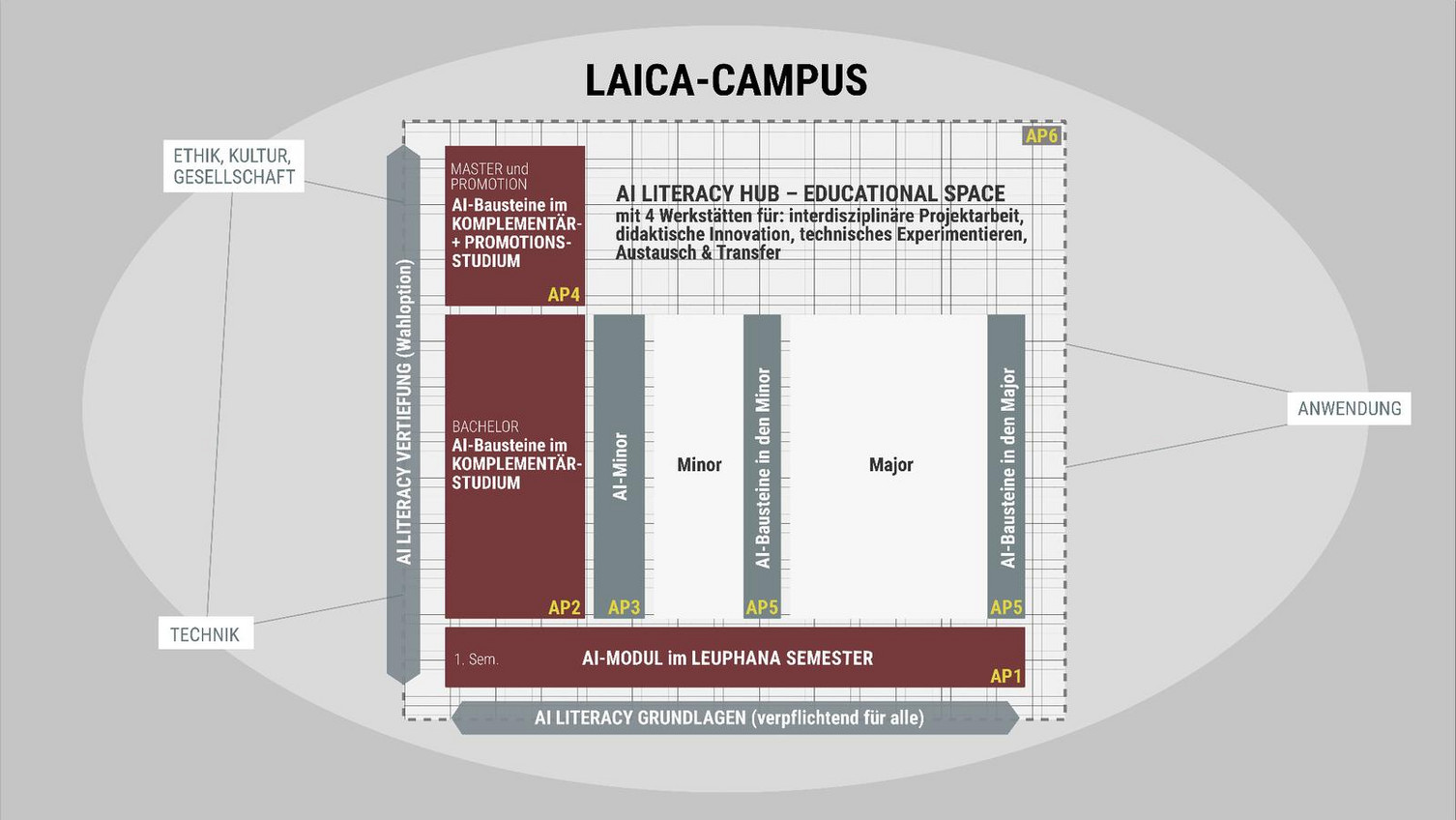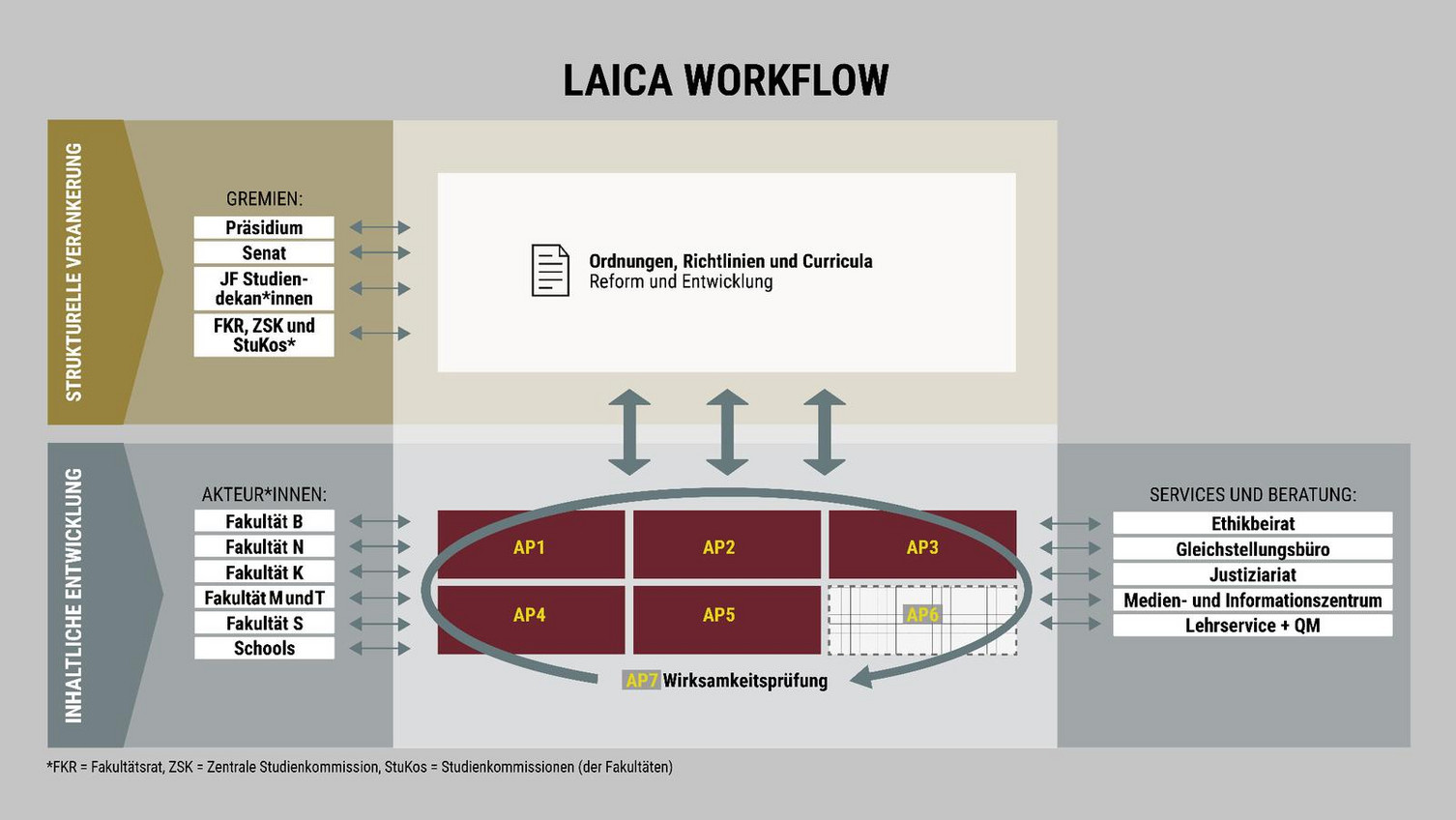Leuphana AI Campus (LAICA)
With the Leuphana AI Campus (LAICA) project, Leuphana University is developing a teaching and study architecture for comprehensive AI literacy education that is unique in Germany. The aim is to anchor artificial intelligence as a learning subject and didactic tool in an interdisciplinary and interdisciplinary manner in all phases of study from bachelor's to doctoral level. The “AI Literacy Campus” is intended to serve as a model for the educational landscape. LAICA enables students to understand, apply and help shape AI responsibly. A new “AI Literacy Hub - Educational Space” (LAICA Hub) will develop and test innovative teaching formats and prepare them for transfer.
The project is based on UNESCO's “AI Competency Framework” (2024) and the Dagstuhl Triangle (Brinda et al. 2016). These models correspond to Leuphana's educational aspirations, which combine interdisciplinary and transdisciplinary breadth with subject-specific depth.
The primary target group is the students, who benefit directly from the new courses and are involved in the development of the work packages. The work packages (WPs) are structured along a vertical (basic, compulsory) and a horizontal axis (in-depth, optional) (see Fig. 1). These complement each other in terms of content in order to anchor AI in all study phases.
WP 1: AI Literacy Module in the Leuphana Semester
Responsible: Prof. Dr. Burkhardt Funk, Bennet Etsiwah, Nicola Teuber
The foundational module “AI Literacy” to be developed will be integrated into the curriculum of the interdisciplinary Leuphana Semester, which is mandatory for all Bachelor students. The module focuses on both technical and societal aspects, aligned with the “understand” proficiency level of UNESCO’s AI Competency Framework and all perspectives of the Dagstuhl Triangle. The content and structure are based on extensive groundwork laid by the DataX and DataXtended projects, through which first-semester students at Leuphana have been taught Data & Digital Literacy since 2018. The goal is to provide students with a comprehensive overview of the potentials and challenges of AI applications, and to enable them to use, design, and critically assess such applications in a responsible manner.
WP 2: AI Literacy in the Bachelor Complementary Studies
Responsible: Prof. Dr. Ulf Brefeld, Prof. Dr. Claus Pias
In the complementary studies programme, subject-specific AI Literacy seminars will be established. These offerings are tailored to varying levels of prior knowledge and lead to AI certificates.
WP 3: Minor in “Artificial Intelligence” for Bachelor Students
Responsible: Prof. Dr. Ricardo Usbeck, Martin Kohler
A new minor in “Artificial Intelligence” is being developed, offering Bachelor’s students from all disciplines (with the exception of teacher training programmes) an interdisciplinary specialisation in the field of artificial intelligence. The AI minor is aimed at students who want to gain a broad understanding of AI, critically examine its role in society and apply AI in practice. The minor consists of six compulsory modules in which technical foundations are taught and AI is applied to the fields of culture, education, sustainability, law and economics. The minor concludes with an interdisciplinary project.
The minor is characterised by innovative teaching and examination formats that promote active student participation and in-depth engagement with real-world AI applications. Practical work in the Creative Space laboratory enables students to directly apply their theoretical knowledge and deepen it in an experimental way. The AI Minor Conference offers students a platform to present their project work and exchange ideas with experts from various fields of AI.
WP 4: AI Literacy in the Graduate School’s Master Complementary and Doctoral Studies
Responsible: Prof. Dr. Simone Abels, Dr. Anja Soltau, Claudia Echelmeyer
In the Graduate School, AI Literacy will be integrated into the curricula via interdisciplinary modules in four new formats:
- A profile-building AI Literacy track across the three complementary modules with societally relevant focuses;
- An international, digital, and collaboratively designed Research>>AI Winter School for doctoral students, developed with partner universities;
- International visiting fellows with interdisciplinary AI expertise involved in both study formats;
- Multiplier events involving relevant AI stakeholders for all graduate students.
At the start of the project, a competency taxonomy will be developed using the Future Skills framework (Stifterverband 2021) and insights on the responsible use of AI in research (e.g. European Commission 2025). This taxonomy will guide formative and summative evaluations to assess the gained competencies and conditions for success.
WP 5: AI Literacy in the Bachelor Programmes of the Faculty of Management and Technology
Responsible: Prof. Dr. Brit-Maren Block
In the Faculty of Management and Technology, AI-related content will be embedded into the curricula. At the same time, AI-based tools for individual learning support and assessment design will be piloted.
WP 6: AI Literacy Hub – Educational Space (LAICA Hub)
Responsible: Prof. Dr. Dana-Kristin Mah & Prof. Dr. Marcus Pietsch
The planned LAICA Hub will serve as a physical and virtual space for the exchange and development of AI literacy education, and for the use of AI as a tool in teaching, learning, and assessment. Four hub workshops will be established to foster collaboration among stakeholders and units, and to create spaces for creativity, discourse, and experimentation:
- A didactics workshop for developing legally compliant teaching concepts for the use of AI in studies, teaching, and exams, needs assessments among teachers and students, and the development of support formats and training programmes;
- An experimentation and learning workshop for working on AI projects and exploring new technologies in a “Maker Space”;
- A transfer workshop for building a network to promote AI Literacy with regular meetings and cooperation at regional and (inter)national levels;
A project workshop for regular exchange within the interdisciplinary project team and to address ethical issues.
WP 7: Effectiveness Assessment
Responsible: Prof. Dr. Mario Mechtel and Prof. Dr. Johannes Lohse
The evaluation captures impact, needs, and competency development among students. Innovative survey instruments ensure the continuous quality development of the teaching offerings.


